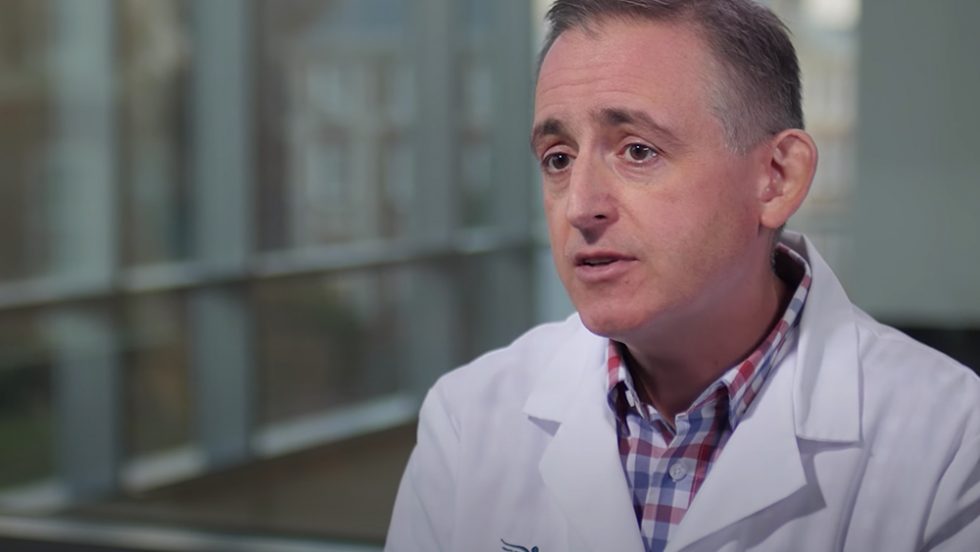
In an interview, K.C. Rondello, MD, clinical associate professor in Adelphi’s College of Nursing and Public Health—and national authority on disaster epidemiology—discusses the coming year.
As the COVID-19 pandemic evolves, people across the world are looking for guidance from knowledgeable health experts. One of those experts is the epidemiologist K.C. Rondello, MD, clinical associate professor in the Adelphi University College of Nursing and Public Health. An authority on disaster epidemiology, Dr. Rondello has been sought out by numerous media outlets, including The New York Times, Newsweek and Men’s Health, for his insights.
Dr. Rondello played a leadership role in Adelphi’s planning for the 2020-21 academic year, serving as co-chair of the Public Health and Safety planning group of the Restart, Recover and Reimagine initiative. We spoke with him in the middle of June—a few weeks before the University announced its plans to safely reopen campus from August through Thanksgiving—to explore his thoughts on the COVID-19 response so far and the challenges that lie ahead.
Have we done enough to mitigate the spread of the virus?
As we enter this next phase in the evolution of the pandemic, what concerns many of us most is the very real issue of protection fatigue. Masks are uncomfortable, physical distancing is inconvenient, and we are all desperate for our lives to resume some normalcy. I completely understand. But as we “loosen the bolts” and carefully increase our mobility, there is a real risk of an increase in cases, and, sadly, that is precisely what is happening in some areas of the country. If we change our behavior prematurely, before the virus is under control and the population has herd immunity, COVID-19 will come back with a vengeance.
What might we expect in the coming year, and how can we prepare for it?
At the very least, we can expect a low level of endemic cases throughout the rest of the year, with spikes and flare-ups in different regions at different times. There is also the possibility of another nationwide wave that eclipses the one we experienced in the spring. The good news is we have been through this before. Businesses adapted, schools switched to distance learning, and people figured it out. Think about what was hardest for you at the height of the shelter-in-place order and prepare for that eventuality again.
What will we need to do to reopen the country safely?
The best approach is one that is gradual—one that occurs in phases as we thoughtfully and judiciously bring ourselves back up to full speed. If we act too quickly or not carefully, the results could be catastrophic. You can see that playing out in the states that went “back to normal” way too quickly. While far from perfect, the incremental approach being adopted by New York, New Jersey and other heavily hit states is the right one and should serve as a model for best practice across the rest of the country.
How long do you think we will need to practice social distancing, mask wearing and handwashing?
We will not be living this way forever, but it’s reasonable to expect that some of the measures we have adopted will continue for the foreseeable future, and others should become a permanent part of our lives moving forward. It will be interesting to see what happens with handshaking down the road. Many experts, like Dr. Anthony Fauci, believe we should avoid it permanently, but cultural change is difficult. I know that I personally will avoid it whenever possible in the future. It’s reasonable to continue some sort of face covering whenever you are around people outside of your home until we are confident that we have achieved community protection through herd immunity. Unfortunately, that’s not going to come any time soon.
Is the virus here to stay, becoming endemic, like HIV or measles, as some recent news reports suggest?
The most likely scenario for COVID-19 is that, like SARS, H1N1 and other novel diseases that have occurred recently, once the immediate crisis is over and the epidemic has been controlled, COVID-19 will become a recurring disease at less-than-epidemic levels. Eventually, there will be a vaccine, and that will more probably prevent COVID-19 from reaching the devastating prevalence we’ve seen recently. But it’s not going away for good, so we need to plan on addressing this disease one way or another in the years ahead.